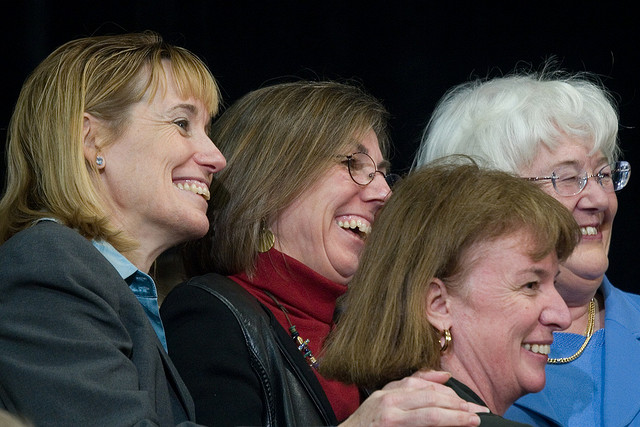Building long-term relations of trust between civil society, voters and female politicians is essential to gender quotas’ success
Over recent decades, more than 100 countries have introduced gender quotas worldwide. The international community has championed quota policies as a fast track to increase women’s presence in national parliaments. This, argues Anouk Lloren, has greatly contributed to their adoption, sometimes in countries exhibiting a long patriarchal tradition. But are gender quotas effective?
Studies show that quotas are important factors for increasing women’s participation in politics. But they also highlight that quotas are not enough to assure women’s sustainable representation over time. Long considered as a barrier, the role of political parties for increasing women in elected office deserves more attention. Rebeca Grynspan, UNDP Associate Administrator proclaims:
“Quotas alone will not get women elected nor ensure them a seat in Parliament. Political parties need to embrace women candidates and actively promote them”
Parties are now often considered as the missing link in understanding women’s under-representation in politics. But how are policies such as gender quotas implemented at the party level? A study I conducted last year in Morocco illustrates how. I examined the changes that the social-democratic party (SUPF) underwent after the introduction of reserved seats for women in 2002. I gathered information by moderating a focus group with about 15 women who serve(d) as (former) members of parliament, elected officials, party officials and activists.
The introduction of gender quotas in Morocco was mainly aimed at improving its status in the international arena. But it wasn’t simply a top-down process neither. Gender quotas received massive support from civil society and female activists within political parties. They were seen as a way to ensure women’s representation in the long run and as a step towards consolidating democracy, both for parties and for the political system as a whole. Until the adoption of the Electoral Law in 2011, quotas functioned as a voluntary agreement between political parties. Initially, they guaranteed 30 seats out of 325 to women in the lower chamber. The 2011 electoral reform increased reserved seats for women to 60 out of 395 and added 30 reserved seats for young Moroccans under the age of 40. Women candidates run on national closed party lists and are elected through a proportional system with a threshold of 3%. The other 305 members of parliament are elected in 92 local constituencies through a proportional representation system and the electoral threshold is 6%.
Reserved seats are the most effective type of quota to increase women’s numerical presence in legislative bodies. In Morocco, they indeed functioned as a ‘fast-track’. After their introduction, the percentage of women in the lower chamber jumped from less than 1% to more than 10%. Following the Arab spring and the 2011 uprisings, reserved seats for women increased from 30 to 60. Women’s proportion reached the threshold of 15% in the subsequent election.
But a closer look reveals that reserved seats also come with costs. They can prevent female parliamentarians from building a local constituency that is essential to ensure durable electoral and political support. In Morocco, the overwhelming majority of women
elected in parliament only ran on women’s national lists, rather than on local district lists. When women did run in local constituencies, they usually failed to get elected. Overall, only 2% of women hold district seats and this proportion has barely changed since 1993, the year the first women entered parliament. My study reveals that women are often dissuaded to run in local districts by the party’s lack of support.
The party prefers that women compete against each other in order to obtain a position on the women’s national list rather than against men to win citizens’ votes. So the competition takes place within the party during the recruitment phase rather than during the electoral campaign. Women placed at the top of the list are almost certain to get elected according their party’s electoral strength. This accounts for their invisibility during electoral campaigns. And the money allocated by the state to promote women’s political participation is used to support men running in local districts.
The interviewees also reported that women elected through quotas are often portrayed as ‘tokens’ or ‘proxy women’ with no real political power. They often owed their selection on electoral lists to family ties, in particular to their fathers or husbands. It’s not surprising that citizens and voters don’t think of gender quotas as promoting democracy. They rather see quotas as a mechanism that serves patronage politics and legitimises authoritarian regimes in the international arena.
Only 35 countries have established reserved seats for women in parliaments at the national and subnational level worldwide (Global Database of Gender Quotas 2013). This type of quota is popular in developing countries, especially in Africa and, to a lesser extent, in Asia. Like Morocco, India and Rwanda have established reserved seats for women. These two quota experiences are often presented as success stories. Interestingly, the experience in Morocco stands in sharp contrast to the Indian and Rwandan case.
In the later countries, reserved seats have triggered a virtuous circle. Rwanda adopted constitutional quotas stating that women should occupy at least 30% of positions in decision-making institutions, such as the government and the parliament. 24 seats out of 80 are reserved for women in the lower chamber and women candidates run on a separate electoral list for these seats. But parties must also present 30% of women for district lists. As a consequence, Rwanda has the biggest proportion of women elected in parliament worldwide since 2003: Their proportion steadily increased from 48.8% in 2003, 56.25% in 2008 to 63.75% in 2013.
In India, one third of local councils seats are randomly reserved for woman. Research by Rikhil Bhavnani has shown that quotas maintain their positive effect when they are withdrawn after one election. Apart from the incumbency advantage, gender quotas contributed to the improvement of women’s status in politics by boosting women’s self-confidence in their electoral chances and by ‘allowing parties [and the public] to learn that women can win elections’.
In light of these two positive experiences, the Moroccan case reveals that legal measures are not enough to ensure women’s sustainable representation. The promotion of women’s participation and representation is based on the capacity of women politicians to build local ties to capitalise political support in a long-term perspective. Local ties and a strong electoral base have to be built by regularly engaging with voters, female voters and civil society.
—
Note: this post represents the views of the author, and not those of Democratic Audit, the LSE. Please read our comments policy before posting.
—
 Anouk Lloren is a postdoctoral fellow with the Swiss National Science Foundation and a lecturer at the University of Geneva.
Anouk Lloren is a postdoctoral fellow with the Swiss National Science Foundation and a lecturer at the University of Geneva.






 Democratic Audit's core funding is provided by the Joseph Rowntree Charitable Trust. Additional funding is provided by the London School of Economics.
Democratic Audit's core funding is provided by the Joseph Rowntree Charitable Trust. Additional funding is provided by the London School of Economics.
Proportional representation of women is needed, say @democraticaudit: https://t.co/fWxPtKLlJb
Contribution to ongoing debate-》RT “@democraticaudit: How can the success of gender quotas be ensured? https://t.co/sJK3Z2EsZT“
How can the success of gender quotas be ensured? https://t.co/mO3j1RLeBZ
Building long-term relations between civil society, voters &female politicians is essential to gender quotas’ success https://t.co/tivkK9xUeA
How do we ensure the success of gender quotas when and where they’re tried? https://t.co/fLnCXQ7MKO
How wider trust crucial to success of quotas for women politicians https://t.co/4zHcf8mF4c #femalerepresentation via @democraticaudit
Building long-term relations of trust between civil society, voters and female politicians is… https://t.co/geHqsUUdhc https://t.co/9q620wsrOZ
Trust between #civsoc, voters & female politicians essential to gender quotas’ success via @democraticaudit https://t.co/lhO7h9102C
Building long-term trust between civil society, voters and female politicians is essential to gender quotas’ success https://t.co/bFzkeqOZRm
Building long-term relations of trust between civil society, voters and female politicians is essential to gender… https://t.co/XMHbngMPmj